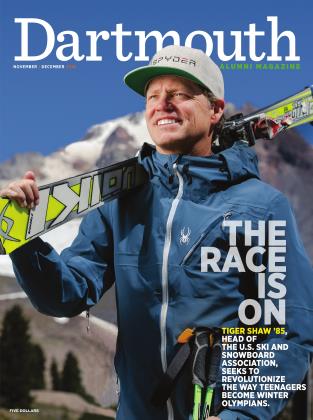Rumors as Evidence
Love, Paul Gambaccini Under the Yew Tree
by Paul Gambaccini ’70
448 pages $15.50
For U.S. readers, certain aspect of Love, Paul Gambaccini: My Year Under the Yewtree may be lost in translation, from the lingo of the British legal system—“bail” can mean something quite different in London than it does in New York—to celebrities such as Jimmy Savile, the once-beloved TV and radio personality who, after his death in 2011, became the subject of a massive sex-abuse investigation called Operation Yewtree. But Americans will have no trouble grasping the essence of this impassioned, at times embittered memoir by Gambaccini, a Bronx-born BBC Radio presenter who spent more than a year caught up like a kite in Operation Yewtree’s branches. As Gambaccini recounts his experience, the allegations against him—by two men who claimed he had abused them many years earlier—were part of a police witch-hunt that treated the flimsiest rumors as evidence of guilt. Accused of having looked the other way with Savile, the police responded with what Gambaccini and independent observers have described as a brutal overreaction in which civil liberties, as Americans understand such things, were repeatedly trampled. The case against Gambaccini was eventually dropped, but not before he was arrested in a 2013 Metropolitan Police raid on his home, his career all but destroyed by repeated leaks about the case to the press, which appeared to be working symbiotically with the police. At the heart of Gambaccini’s predicament are questions that will haunt readers on both sides of the Atlantic: If you can be arrested as a sex offender simply because someone who has no proof says you are one, how can you defend yourself? Don’t the police have a responsibility to investigate such a claim, and to determine its validity, before dragging someone’s reputation through the mud? —Kevin Nance
Dinesh D’Souza ’83
Hillary's America
Regnery Publishing
The conservative commentator (profiled in the January/February 2015 DAM) argues that the election of Hillary Clinton as president of the United States would transform America into a land of rapacious crony capitalism. Fie says the country’s only hope is a resurgent Republican Party focused on civil rights and economic opportunity.
James P. Lenfestey ’66
If Bees Are Few
University of Minnesota Press
Essayist and poet Lenfestey edits an anthology of 2,500 years of poetry that buzzes with bees—from Sappho and Virgil to W.B. Yeats and Sherman Alexie—at a time when the pollinators are increasingly threatened. The book’s title, taken from a poem by Emily Dickinson, reflects the urgency of research to save the bees.
James T. Kloppenberg ’73
Toward Democracy
Oxford University Press
Reflecting on four centuries of governance in Europe and America, Harvard professor Kloppenberg explores the idealistic nature of democracy and the ways in which nations have fallen short in developing societies based on autonomy and equality. He argues that democracy was and remains an ethical ideal rather than a plausible institution.
Robin O’Sullivan ’99
American Organic
University Press of Kansas
Cultural historian O’Sullivan traces the organic food movement from 1940s agricultural pioneers to current consumer activists. In examining farmers, government regulations, gardeners and mega-industries, she finds organic production and consumption are entrenched in the lives of all Americans, whether they eat organic food or not.
Tara Dairman ’01
Stars So Sweet
G.P. Putnam’s Sons
Gladys Gatsby juggles the drama of middle school and her secret life as New York City’s youngest restaurant critic in this third installment of Dairman’s middle-grade foodie series. It’s “an enjoyable entry about finding one’s place and learning how to deal with problems,’’ according to School Library Journal.
Find additional alumni books at dartmouthalumnimagazine.com.
 View Full Issue
View Full Issue
More From This Issue
-
 FEATURE
FEATUREIn a League of His Own
November | December 2016 By TY BURR ’80 -
 COVER STORY
COVER STORYKing of the Hill
November | December 2016 By JAMES ZUG ’91 -
 FEATURE
FEATUREDramatically Different
November | December 2016 By HEATHER SALERNO -
 THE DAM INTERVIEW
THE DAM INTERVIEWPhil Hanlon ’77
November | December 2016 By C.J. Hughes ’92 -
 RETROSPECTIVE
RETROSPECTIVETales of the Nugget
November | December 2016 By JESSICA FEDIN ’17 -
 MEDICINE
MEDICINEA Zika Response
November | December 2016 By KAITLIN BELL BARNETT ’05
Pursuits
-
 pursuits
pursuitsHerbal Essence
MAY | JUNE 2017 By Abigail Drachman-Jones ’03 -
 PURSUITS
PURSUITSBody and Soul
NOVEMBER | DECEMBER 2022 By Claire Callahan '22 -
 PURSUITS
PURSUITSMusic Man
NOVEMBER | DECEMBER 2019 By George M. Spencer -
 PURSUITS
PURSUITSPuck Promoter
JULY | AUGUST 2020 By Jim Collins ’84 -
 Pursuits
PursuitsShooting the Truth
JULY | AUGUST 2016 By Kaitlin Bell Barnett ’05 -
 PURSUITS
PURSUITSSanctuary
JULY | AUGUST 2020 By Sue Shock

